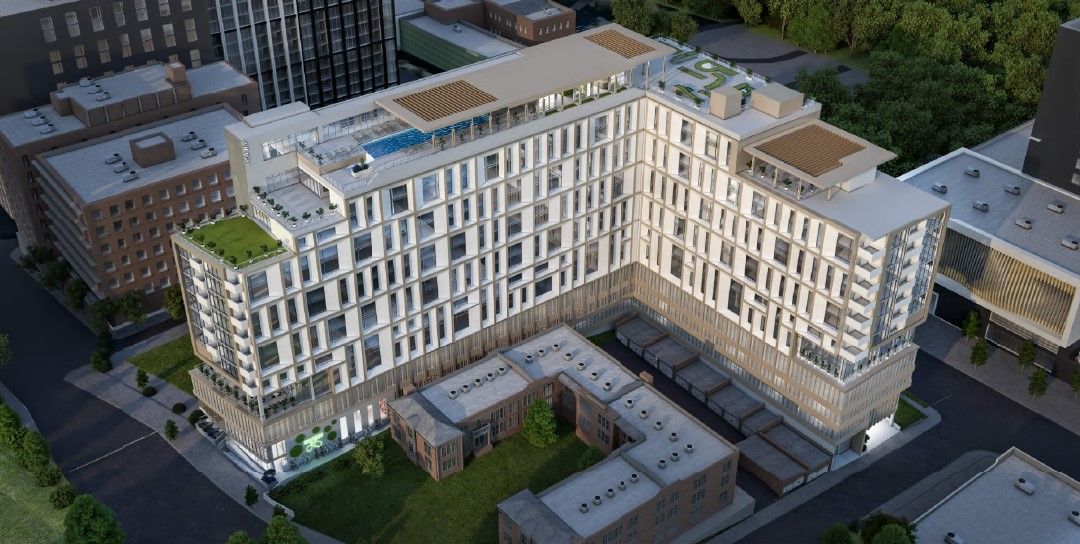Path to Reopening: Interface Reconfigures its HQ to Create Safer Post-Pandemic Space
Flooring company applied its detail-oriented eye for design to its Base Camp to welcome back employees
Published: 03/04/2021
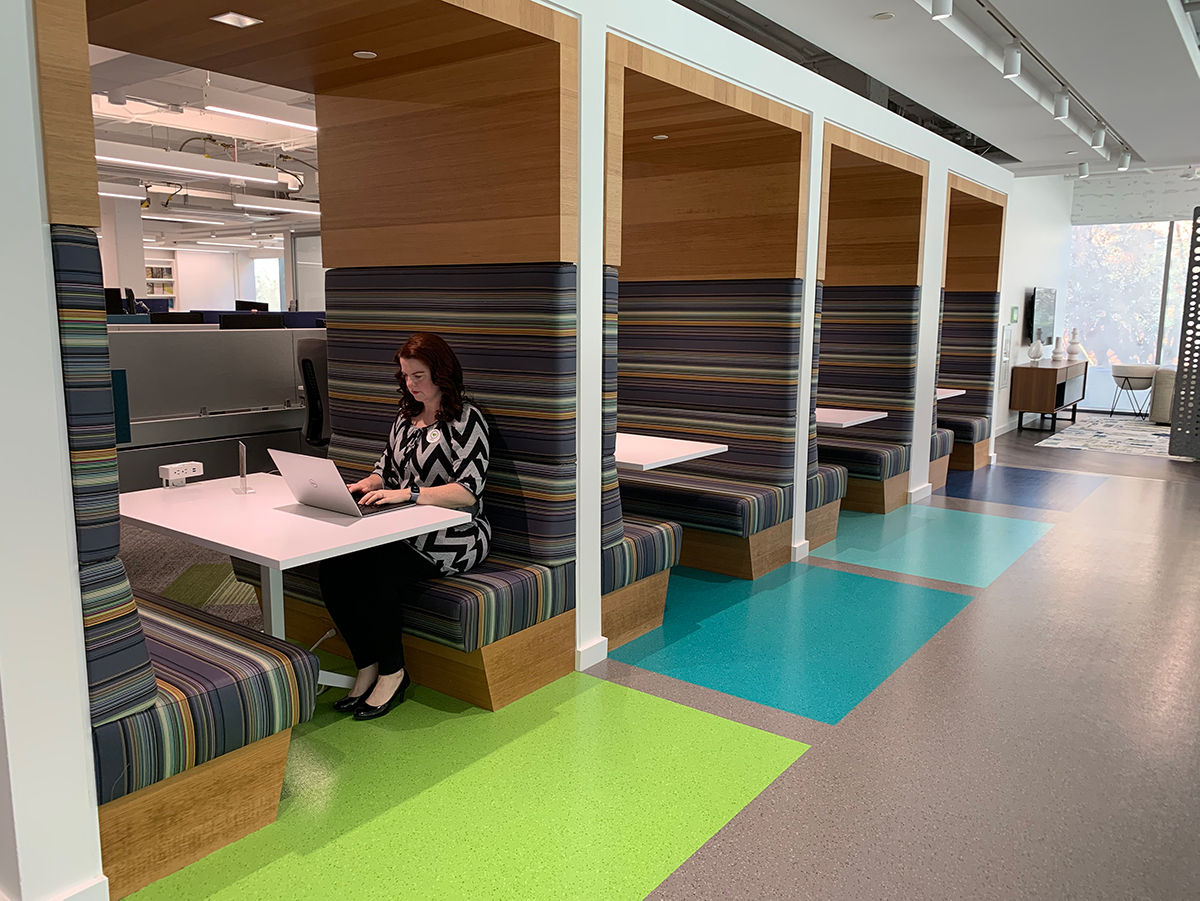 Among the solutions Interface has found is using its own flooring designs to denote six-foot zones for social distancing. Image credit: Interface
Among the solutions Interface has found is using its own flooring designs to denote six-foot zones for social distancing. Image credit: Interface
BY ELLIE HENSLEY
Flooring manufacturer Interface Inc. plans to bring its metro Atlanta employees back to its Midtown headquarters — but not before giving thought to every detail about how its office operates, and making changes as needed to keep its employees safe.
Currently, between 15 and 20 percent of Interface's approximately 150 employees are reporting daily to its “Base Camp” at the corner of West Peachtree and 16th Streets. The office reopened after Atlanta Mayor Keisha Lance Bottoms lifted the city’s shelter-in-place order in May, and occupancy levels have been slowly increasing since.
“We’re not going to be a permanent, work-from-home-all-the-time company,” said Greg Minano, Vice President and Chief Human Resources Officer at Interface. “We believe a properly configured space will drive the type of culture and collaboration activity that we think is essential to meet our strategic goals.”
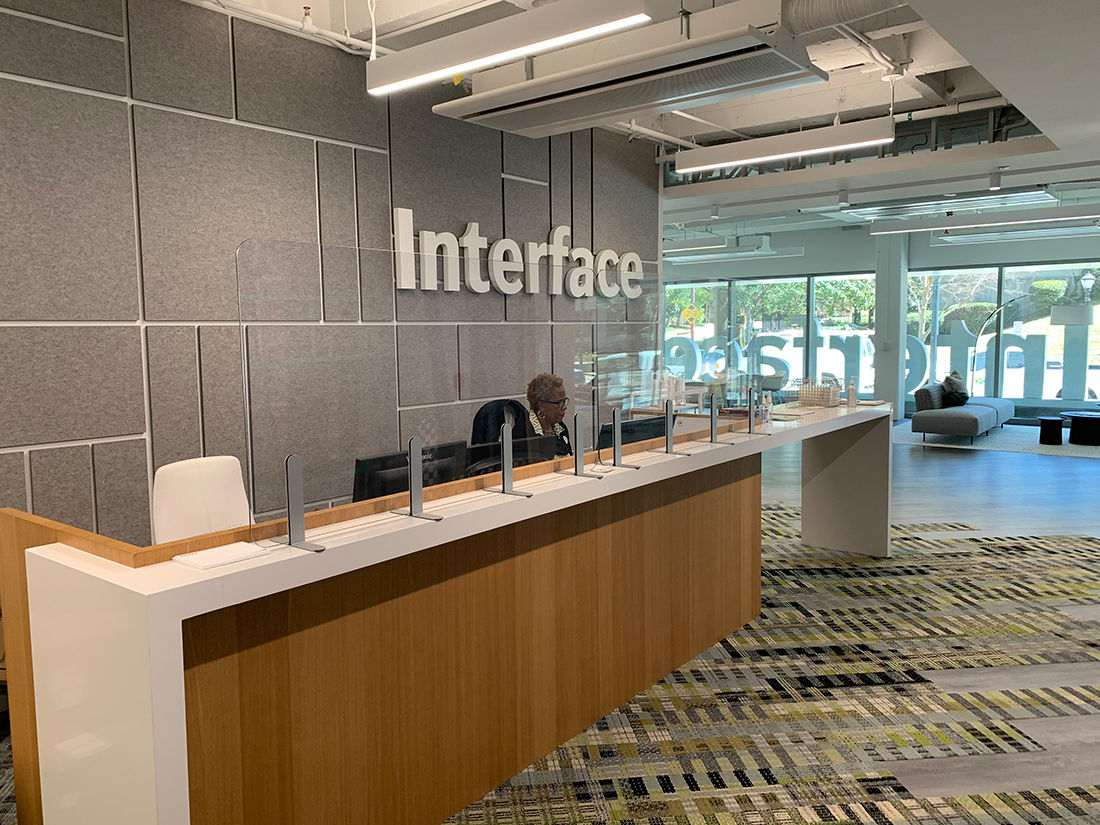 Interface's Base Camp has a new clear partition in the reception area for the protection of guests and employees. Image credit: Interface
Interface's Base Camp has a new clear partition in the reception area for the protection of guests and employees. Image credit: Interface
Interface has a total of 4,000 employees, about half of whom work in an office environment. The company announced its decision to relocate its global headquarters from Vinings to Midtown Atlanta in 2016, and two years later it unveiled its headquarters near the Woodruff Arts Center and just across from the Arts Center MARTA Station.
“We’re a commercial flooring company, but we also really believe in high design, which is something you can see when you come into the building,” said Darby Gracey, Global Director of Worklife and Workplace Strategy. “Moving to Midtown and the corner we ended up moving to was intentional, and really fortuitous, because it puts us in the arts hub of Atlanta.”
One of the cornerstones of Interface’s product offerings is sustainability; all of its products are at least carbon neutral and a few new offerings are even carbon negative. The company applied these same principles to creating its Base Camp, an adaptive reuse project inside an aging office building, and achieved LEED Platinum certification from the U.S. Green Building Council. The building is also WELL Certified Gold, a designation bestowed by the International WELL Building Institute for buildings that improve health and human experience through design. It is believed that Interface’s Base Camp is the only building in Midtown to have received both of these certifications.
“Going into 2020, part of my role was going to be about applying WELL concepts to our locations around the world,” said Gracey. “Now it has also become about turning Base Camp into an even safer place in a pandemic-conscious world.”
Taking a Critical Look at Office Life
Before Interface asked employees to come back into the office, leadership took a critical look at what was functioning well at Base Camp, and what could use some adjustments. The effort began with a series of employee surveys that asked what employees liked and what would make them more comfortable to return.
Interface divided potential changes it needed to make into three buckets: design and configuration, technology and ways of working/behavior.
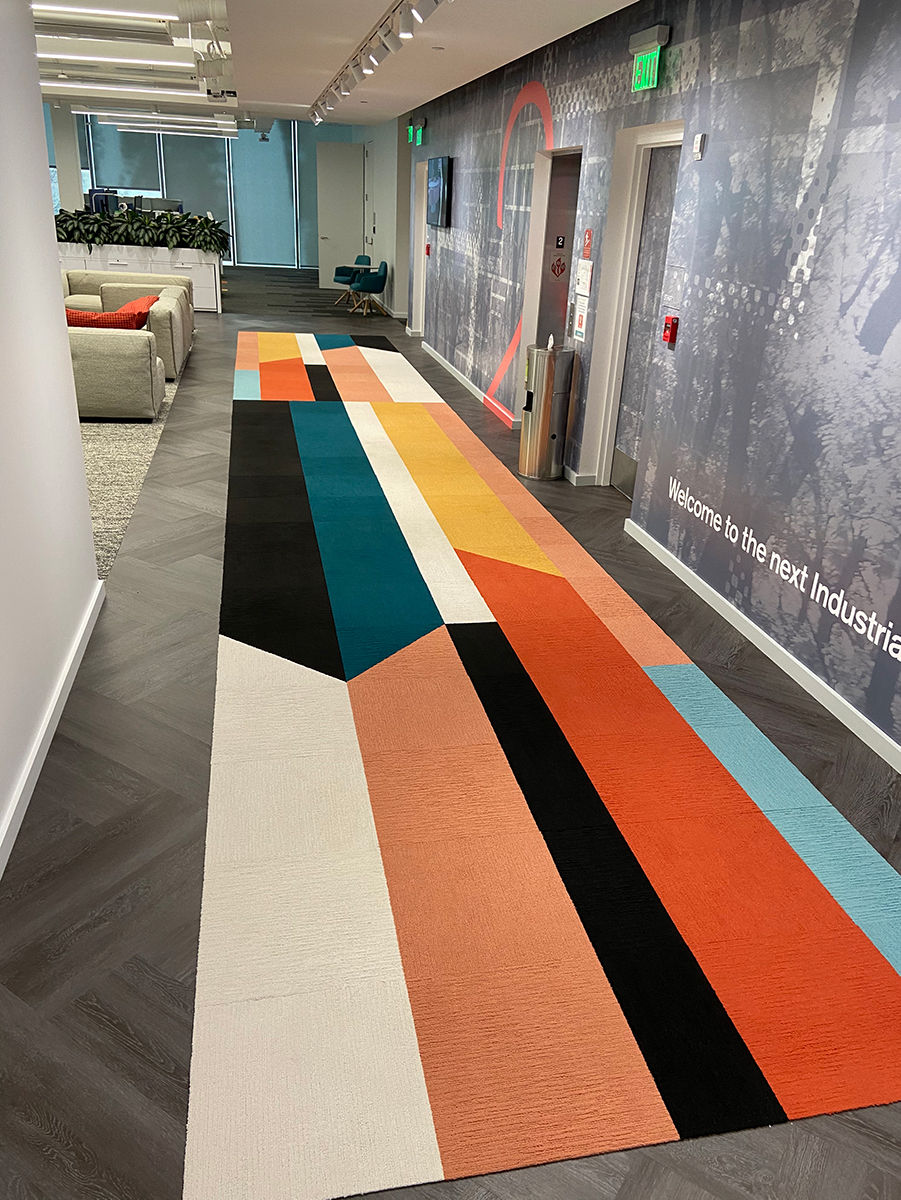
Image credit: Interface
Design and Configuration
Interface has eschewed the descriptor “open plan” for its Base Camp, because its design is more intentional than the average “cube farm” calls to mind, and has plenty of dedicated spaces for open work. Its preferred term is “work choice,” as the company has always encouraged its employees to set up shop where they feel comfortable that day.
“We want people to use the space as it was designed, rather than find they have to sit out in the office kitchen area with their laptop,” Minano said.
Retaining this type of work environment during and after the pandemic is important to Interface, so the company has implemented some design changes that keep the employees safe and at the same time avoid temporarily moving its furniture into storage.
Interface purchased some new equipment to convert its largest conference room into a multi-purpose space, added sound-attenuating panels and installed some of its own modular flooring products with special integrated features in the flooring to encourage employees to maintain social distance. Different colored markers integrated into the flooring guide traffic flow where people should and shouldn’t stand, with variations of color to indicate six foot distances.
“In thinking of the refresh of our space, we were very bullish about the fact that we did not want COVID-19 to design our space for us,” Gracey said. “We knew it had to be factored into whatever went down onto the floor, but we didn’t want it to detract from the beautiful space we want to provide for our customers and employees.”
Base Camp also functions as a showroom, and Interface has already welcomed back a limited number of guests and shown them its new flooring plan.
“A lot of guests love the fact that they can come into our space; it’s a great opportunity for them to interact with our products physically,” Gracey said.
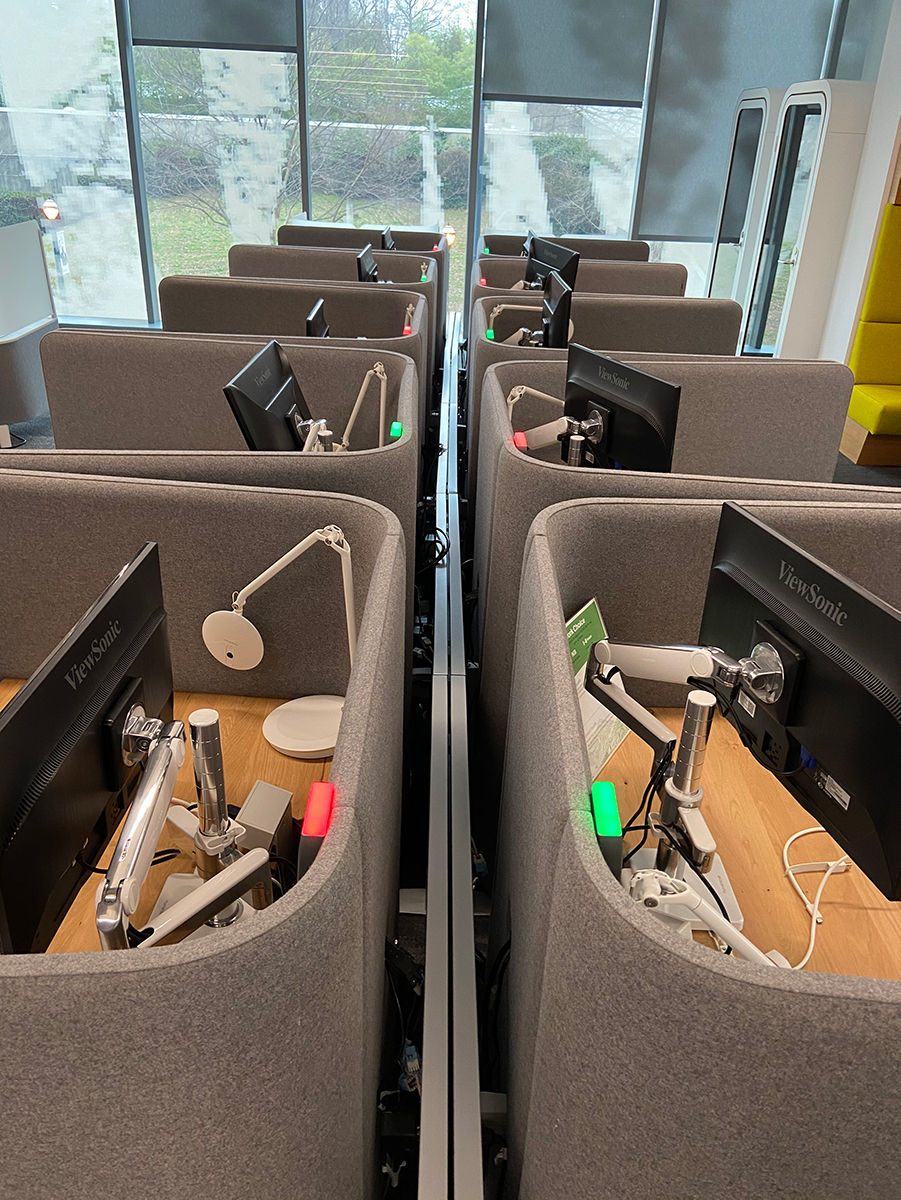
Pucks on each desk show whether the space is available for reservation and use. Image credit: Interface
Technology
Base Camp’s most popular new feature among employees is its desk reservation system, which enables people to pick out and reserve their workspace remotely before coming into the office.
“Pucks,” or small monitors on each desk, indicate whether a given desk is available and also when a desk has been used and needs to be cleaned before it is occupied again. For now, 50% of the desks have been taken offline to create more space between employees.
“We determined this is the most efficient way to maintain the vibe we have, but also be prepared to come back at a higher capacity,” Gracey said. “It saved us from having to move desks out of the building or go through the design process twice.”
The building’s rooftop space, once primarily used by the sales team for events, has been equipped with a stronger WiFi signal so employees can work outdoors overlooking the Midtown skyline and the Arts Center MARTA station.
Although the company's employee transit pass subsidy plan is temporarily on hold while most staffers work from home, the MARTA station was one of Interface’s primary motivations for choosing its new Base Camp location. In the past year, the Arts Center Station’s West Peachtree frontage has undergone major improvements, including new seating and a mural by local artist Stacie U. Rose.
“Having immediate access to mass transit was an important decision factor in choosing where we ended up,” Gracey said. “The overall aesthetic improvements were really welcomed.”
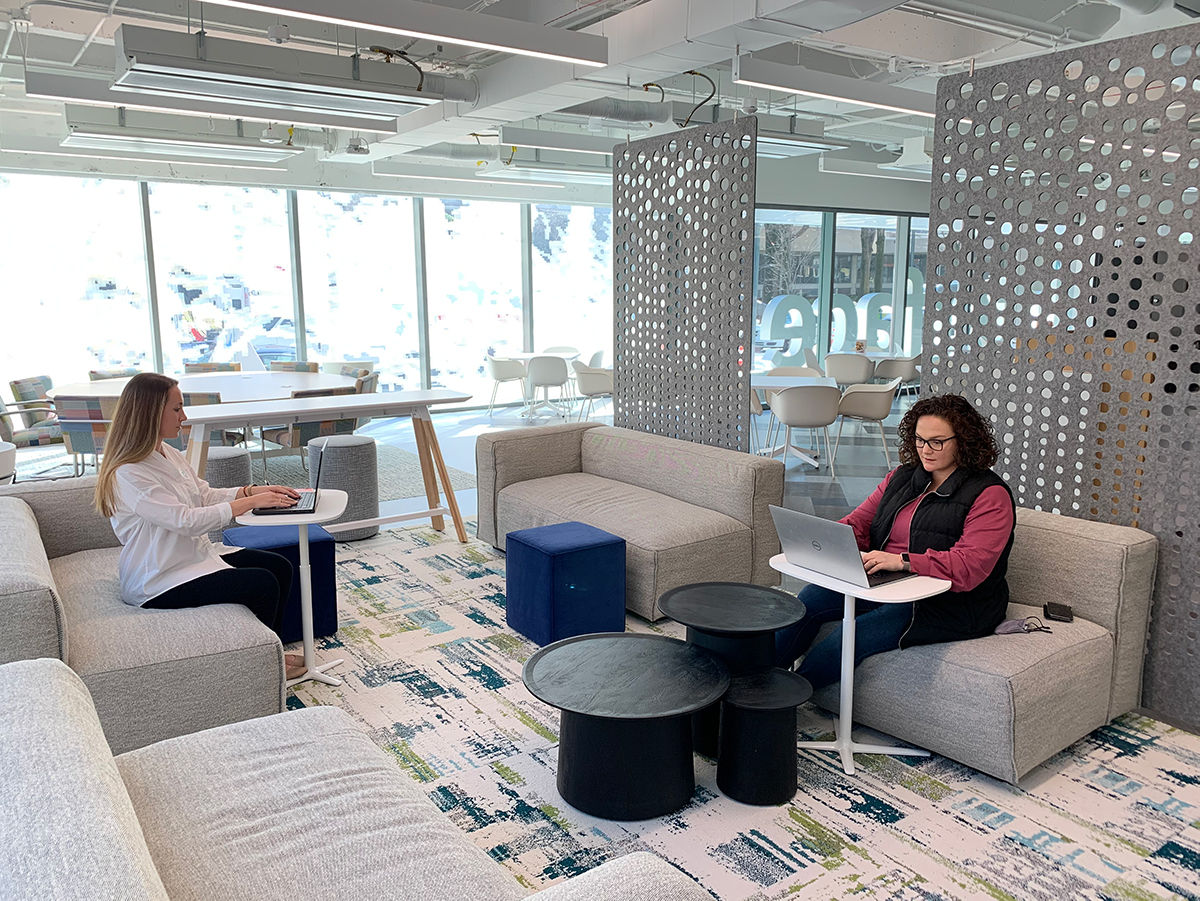 Image credit: Interface
Image credit: Interface
Ways of Working
Every morning, Base Camp employees receive an email assessment asking if they’ve had any COVID symptoms, done any travelling or been exposed to environments where it wasn’t possible to social distance. Their questionnaire must get approved before they report to the office, and then they check in to receive a sticker (similar to the “I Voted” stickers given out at polling places) to wear for the rest of the day.
“It’s a visual confirmation for everyone else in the building that you’ve personally taken all the steps that need to be taken,” said Gracey.
Employees are required to wear masks when they are up walking around in the building, but not while sitting down at least six feet away from one another.
Signage is posted everywhere to remind people to wash their hands, limit two people per elevator and practice respiratory etiquette.
“At this point, these are table stakes for spending time in public, but they are things we hit on regularly,” Gracey said.
 Interface employees at Base Camp in Midtown collaborate while wearing masks. Image credit: Interface
Interface employees at Base Camp in Midtown collaborate while wearing masks. Image credit: Interface
Building a Culture of Collaboration
Interface is monitoring virus case counts and the COVID-19 vaccine roll out closely, and when the company believes it is safe enough, it will more formally ask employees to return to work at Base Camp.
“We believe in the role that office can play as a point of collaboration in culture building,” Minano said. “It’s very difficult to build culture around a Zoom call… Yes, you can get the basics done, and we proved that in early April when we moved to a virtual environment. But it makes it more difficult to drive our strategic agenda forward and articulate our sustainability goals.”
Employees who are immunocompromised, have very young children or children who remain in a virtual learning environment will be given extra flexibility. In fact, any employee who feels they will be more productive working from home on an occasional basis will be encouraged to do so.
“It’s been a cultural change for us," Minano said. And we think we will see the benefits of being a permanent modified work-from-home and in-person environment.”



